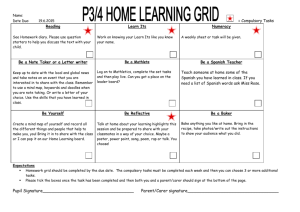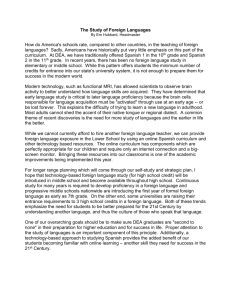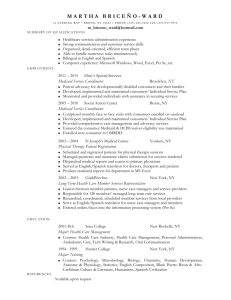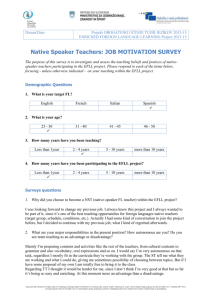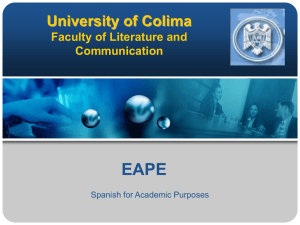SPANISH FOR SPANISH SPEAKERS 1/2
advertisement
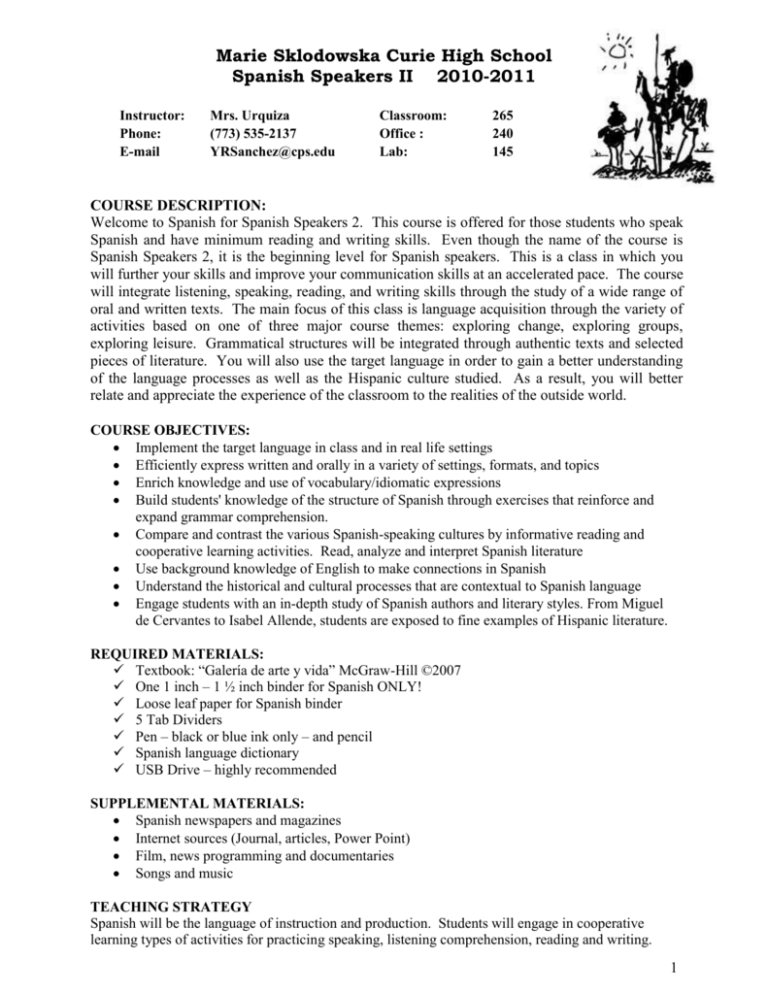
Marie Sklodowska Curie High School Spanish Speakers II 2010-2011 Instructor: Phone: E-mail Mrs. Urquiza (773) 535-2137 YRSanchez@cps.edu Classroom: Office : Lab: 265 240 145 COURSE DESCRIPTION: Welcome to Spanish for Spanish Speakers 2. This course is offered for those students who speak Spanish and have minimum reading and writing skills. Even though the name of the course is Spanish Speakers 2, it is the beginning level for Spanish speakers. This is a class in which you will further your skills and improve your communication skills at an accelerated pace. The course will integrate listening, speaking, reading, and writing skills through the study of a wide range of oral and written texts. The main focus of this class is language acquisition through the variety of activities based on one of three major course themes: exploring change, exploring groups, exploring leisure. Grammatical structures will be integrated through authentic texts and selected pieces of literature. You will also use the target language in order to gain a better understanding of the language processes as well as the Hispanic culture studied. As a result, you will better relate and appreciate the experience of the classroom to the realities of the outside world. COURSE OBJECTIVES: Implement the target language in class and in real life settings Efficiently express written and orally in a variety of settings, formats, and topics Enrich knowledge and use of vocabulary/idiomatic expressions Build students' knowledge of the structure of Spanish through exercises that reinforce and expand grammar comprehension. Compare and contrast the various Spanish-speaking cultures by informative reading and cooperative learning activities. Read, analyze and interpret Spanish literature Use background knowledge of English to make connections in Spanish Understand the historical and cultural processes that are contextual to Spanish language Engage students with an in-depth study of Spanish authors and literary styles. From Miguel de Cervantes to Isabel Allende, students are exposed to fine examples of Hispanic literature. REQUIRED MATERIALS: Textbook: “Galería de arte y vida” McGraw-Hill ©2007 One 1 inch – 1 ½ inch binder for Spanish ONLY! Loose leaf paper for Spanish binder 5 Tab Dividers Pen – black or blue ink only – and pencil Spanish language dictionary USB Drive – highly recommended SUPPLEMENTAL MATERIALS: Spanish newspapers and magazines Internet sources (Journal, articles, Power Point) Film, news programming and documentaries Songs and music TEACHING STRATEGY Spanish will be the language of instruction and production. Students will engage in cooperative learning types of activities for practicing speaking, listening comprehension, reading and writing. 1 Independent study will be necessary for research projects, oral presentations, writing essays, and exams. Graphic organizers and reading strategies will support the reading comprehension in Spanish. Exposure to authentic cultural material will be achieved through Internet sources, newspapers, magazines, literary works, film, art, music, food, community events and field trips. ASSESSMENTS: Homework/Class Work: 25% Homework is to be turned in on the due date. If homework is turned in late it will receive a grade deduction everyday it is not turned in. Late homework will be accepted without penalization if you have an excused absence. DO NOT expect to be told what your missing homework assignment was. You can ask me or ask your classmates. Participation: 10% You will be expected to speak in Spanish in class at all times, even if you are not addressing me, the teacher. You will also be expected to be engaged in all classroom activities/discussions and come to class prepared. Quizzes: 15% These assignments are given throughout the course of the year. 1 or 2 quizzes are given a week. If a quiz is given and you are absent you will make up the assignment the day you return. Exams/Projects: 25% An exam is given roughly every 2 weeks. If an exam is given and you are absent you will make up the assignment the day you return. Projects are assigned depending on the topic being learned. If a project is not turned in on the due date, it will receive a grade deduction for every day it is turned in late. Binders/Accountability: 25% Binders will be checked roughly every 2-3 weeks. I will explain how binders are to be organized as the beginning of the year progresses. Expectations of a good binder include organization, completion of tasks and neatness. Bell Ringers (accountability): Bell Ringers are given at the beginning of class. When a Bell Ringer is assigned, you will have 5 minutes from the beginning of the class to finish it. If you are tardy, no extra time will be given for you to finish the assignment and therefore will receive no credit. Día de noticias: (participation) At the beginning of class on Monday instead of a Bell Ringer you will be expected to talk about something that you heard in the news or read in the newspaper over the weekend. Tutoring: (accountability) If you are in need of tutoring all you have to do is ask. But please, try to give me at least 2 days advance notice and tell me what topic you need help in. GRADING SCALE: 90-100% = A 80-89 % = B 70-79% = C 60-69% = D 59 below = F 2 FIELD TRIPS: Absolutely no permission will be given to any student who does not have at least a 75% in class during the time of inquiry. Teacher reserves the right to deny permission to any field trip (unless you are a critical participant of the event), if it is not an important part of your educational experience and/or interferences with an important time in this class. Course outline for academic year 2009-2010 Grammar Verbs in the infinitive Present tense verbs Preterit tense verbs Imperfect tense verbs Ser y Estar Comparatives Nouns Pronouns Articles Adjectives Orthography The alphabet The numbers Syllable separation Diptongos/triptongos/hiatos Accents (oral/written) c, /g/, /s/ Punctuation Capitalization Writing Essay Research Paper Formal/Informal letters Transformation of text Poems Corridos Odes Comic Strips Résumé Story/Fable E-mail Postcards Synopsis Journal Dialogue Autobiography book Literature Poems Pablo Neruda Rodolfo “Corky” González Yuri Urquiza Stories “Una carta a Dios” “El gato de Sevres” “Signos de puntuación” “Un mensajero de San Martin” “La yaqui hermosa” “Rosa Leyes, el indio” “Manuel” “Don Quijote de la Mancha y la aventura de los molinos de viento ” “El delantal blanco” Legends Authentic texts Newspaper articles Interviews Advertisements Labels Postcards Vocabulary Greetings/Farewell Calendar/Days/Months Time-telling Nationalities Cognates False cognates Borrowed English words Theme related vocabulary Culture/Art Hispanic artists El Greco Diego de Velazquez Francisco de Goya Pablo Ruiz Picasso Salvador Dali Frida Kahlo Diego Rivera Fernando Botero Humor – pragmatics Heroes Indigenous groups Feelings and Passions USA Immigration Chicano Movement New York Puerto Ricans Miami Cubans México Pre-Colombian history Colonial history Independence Revolution Cinco de mayo Day of the dead Movie - Frida Kahlo Dominican Republic History 3 Famous figures Movie – In the Time of the Butterflies Expected Class Behavior: 1. Follow all Curie Metropolitan High School policies. See student handbook 2. Dress appropriately and wear your student I.D. at all times. 3. Be respectful to others at all times: students, teachers and other school faculty. 4. Raise your hand to make a comment or ask a question. 5. Listen to others while they are speaking. 6. Do not be late to class. You will lose a letter grade if you are tardy more than 10 times. 7. Bring all materials every day. You will not be allowed to go to your locker during class, therefore, come prepared for class. 8. Turn in homework on time. 9. Be responsible for your absences. You are responsible for seeing me to get make-up work. You are required to make-up work missed on the day(s) of your absence. 10. Do not swear, use vulgar language, or insult anyone in any way. 11. Do not bring food or drinks into the class. 12. Do not leave a mess in our classroom. Pick up after yourself. 13. Push your chair into the desk before leaving the class. 14. Do not write on the desks or anywhere in the classroom or school property. 15. Use the restroom during passing period. Restroom use during class time is restricted to Emergencies only! PLAGIARISM WARNING: “Plagiarism is the unauthorized use or close imitation of the language and thoughts of another author and the representation of them as one's own original work”. (Available from http://dictionary.reference.com; Internet, accessed 28 August 2008) All work completed by a student is expected to be the student’s own. Do not plagiarize. Plagiarism is a very serious offense. If it is found that you have plagiarized - deliberately or inadvertently -- you may face serious consequences. Consequences of plagiarism: 1st offense: the student will receive a zero for the assignment and may lose up to 20% of the final grade for that semester. 4 2nd offense: the student may fail the class and be removed from the IB program. FIELD TRIPS: Absolutely no permission will be given to any student who does not have at least a 75% in class during the time of inquiry. Teacher reserves the right to deny permission to any field trip (unless you are a critical participant of the event), if it is not an important part of your educational experience and/or interferences with an important time in this class. 5




